CYANOCOBALAMIN - INJECTION
PHONETIC PRONUNCIATION: (SYE-an-oh-koe-BAL-a-min)
COMMON BRAND NAME(S): Cobal, Cyanoject, Vitamin B-12
GENERIC NAME(S): cyanocobalamin (vitamin B-12)
Uses
USES: Cyanocobalamin is a man-made form of vitamin B12 used to treat low levels (deficiency) of this vitamin. Vitamin B12 helps your body use fat and carbohydrates for energy and make new protein. It is also important for normal blood, cells, and nerves. Most people get enough vitamin B12 in their diet, but a deficiency may occur in certain health conditions (e.g., poor nutrition, stomach/intestinal problems, infection, cancer). Serious vitamin B12 deficiency may result in anemia, stomach problems, and nerve damage.
How to use CYANOCOBALAMIN - INJECTION
HOW TO USE: If you are using this medication at home, learn all preparation and usage instructions from your health care professional. Before using, check this product visually for particles or discoloration. If either is present, do not use the liquid. This medication is given by injection into a muscle or under the skin as directed by your doctor. Dosage is based on your medical condition and response to treatment. Injections may be given daily when you first start treatment. Certain medical conditions (e.g., pernicious anemia) may require you to continue receiving injections every month. Learn how to store and discard needles and medical supplies safely. Consult your pharmacist.
Side Effects
Precautions
Interactions
Overdose
Images
Reviews
Faq for CYANOCOBALAMIN - INJECTION
Cyanocobalamin injection is primarily used to treat and prevent vitamin B12 deficiency. It is also sometimes given as a diagnostic tool in certain conditions like pernicious anemia.
Cyanocobalamin is a synthetic form of vitamin B12. It is converted into active forms of vitamin B12 in the body, which are necessary for various metabolic processes and the production of red blood cells.
Cyanocobalamin injection is usually given by a healthcare professional, either as an intramuscular injection or as a subcutaneous injection. The dosage and frequency of administration will depend on the individual's condition and the healthcare provider's instructions.
Common side effects of Cyanocobalamin injection may include pain or redness at the injection site, diarrhea, itching, or rash. However, these side effects are generally mild and temporary. Serious allergic reactions to Cyanocobalamin are rare but can occur. It is important to seek immediate medical attention if any severe allergic reaction, such as difficulty breathing or swelling of the face, occurs.
Cyanocobalamin injection should not be used in individuals who are allergic to vitamin B12 or any of the ingredients in the injection. It may also interact with certain medications, so it is important to inform the healthcare provider about all current medications and medical conditions before starting Cyanocobalamin injection.
The onset of action of Cyanocobalamin injection varies depending on the individual and the underlying condition. Some people may start experiencing improvement in their symptoms within a few days, while others may take several weeks. Regular administration is usually required to maintain adequate vitamin B12 levels in the body.
In some cases, healthcare providers may teach individuals or their caregivers to administer Cyanocobalamin injection at home. However, it is important to receive proper training and follow the healthcare provider's instructions carefully to ensure safe and effective administration.
Cyanocobalamin injection is generally considered safe to use during pregnancy and breastfeeding. However, it is always recommended to consult with a healthcare provider before starting any medication or supplement during these periods.
If a dose of Cyanocobalamin injection is missed, it is important to contact the healthcare provider for further instructions. Depending on the situation, the dose may need to be rescheduled or adjusted.
Disclaimer
IMPORTANT: HOW TO USE THIS INFORMATION: This is a summary and does NOT have all possible information about this product. This information does not assure that this product is safe, effective, or appropriate for you. This information is not individual medical advice and does not substitute for the advice of your health care professional. Always ask your health care professional for complete information about this product and your specific health needs.
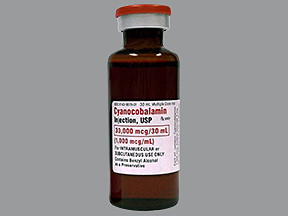
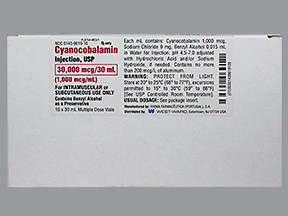

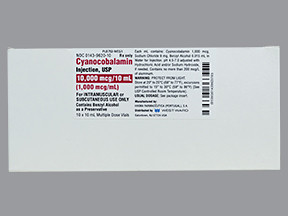
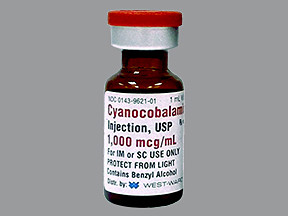
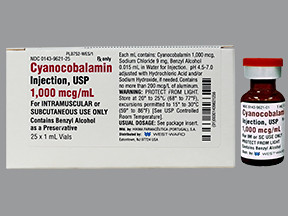
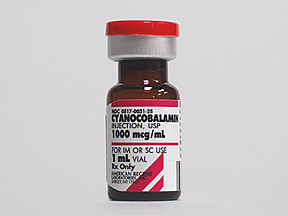
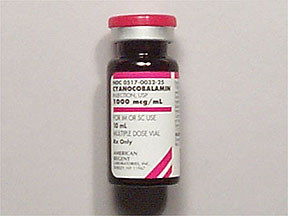
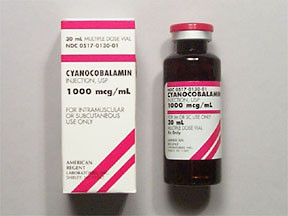
No Reviews Yet